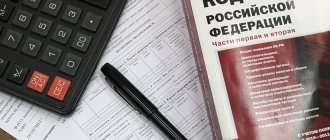What does relinquishment of ownership mean?
Relinquishment of the right of ownership of property is possible (Part 1 of Article 236 of the Civil Code of the Russian Federation). It represents the voluntary renunciation of a thing(s). You can refuse both movable property that is no longer in use, and immovable property, for example, if the costs of its maintenance are significant, but it does not generate income and is not sold.
If the right of ownership is renounced, the property becomes ownerless (Clause 1, Article 225 of the Civil Code of the Russian Federation). Movable things that the owner left behind for the purpose of renouncing ownership are considered abandoned (Clause 1, Article 226 of the Civil Code of the Russian Federation).
Refusal is the basis for termination of ownership rights (clause 1 of Article 235 of the Civil Code of the Russian Federation). However, refusal alone is not enough to stop being an owner. In fact, your ownership right will cease only when a new owner appears in the “abandoned” property (Part 2 of Article 236 of the Civil Code of the Russian Federation). For example, as a result of recognition by the court of the right of municipal ownership of a property or its acquisition by virtue of acquisitive prescription.
To renounce the right of ownership of a specific thing, you need to declare this or take other actions that indisputably indicate that you are withdrawing from the ownership, use and disposal of property and do not intend to retain any rights to it (Part 1 of Article 236 Civil Code of the Russian Federation).
Options for relinquishing property
The owner cannot simply refuse unfoundedly. He needs to document his decision. Not only to formalize it, but also to register it later in Rosreestr. Therefore, there is a procedure for implementing the refusal.
| Privatized property | Inheritance |
| First of all, state-issued municipal housing is privatized. This is how it acquires a single (or several) owner. If a citizen changes his mind about becoming an owner, he deprivatizes the specified housing. Conditions: Possible if the remaining participants who privatized this housing with him express general agreement. The apartment transferred according to the refusal is the only place where citizens permanently live. The residential premises have a free legal status (not mortgaged, not rented). Then the administration accepts the refusal expressed by the owners and re-registers them as tenants following the social tenancy agreement. Important: the reasons for refusal, in principle, do not play a special legal role. As a rule, they are quite significant: Reluctance to continue to maintain common property (as you know, owners pay for major repairs of the house), tax obligations. The desire to participate in a special government program where people are relocated from dilapidated or dilapidated buildings. Several owners are in complex, unregulated relationships | When a citizen dies, his material and financial wealth (real estate, savings, debts) are transferred to his heirs. There is a will - lawyers print it out and follow the wishes of the deceased described there. There is no will - the circle of closest relatives for the deceased is determined (this is the current spouse, children, parents). They are automatically recognized as direct heirs. In principle, heirs have the right to accept or refuse their inheritance of property. The entire procedure takes place with the direct participation of a notary dealing with the affairs of the deceased. The refusal of one heir occurs in favor of the others. If a minor refuses, the procedure is carried out by the guardian with notification and consent of the guardianship. The refusal must be made in writing and certified by a notary. Important: if the refused citizen subsequently changes his mind, it cannot be canceled or annulled. The only exception is in court proceedings, if they prove that it was originally signed by an incapacitated or deceived person |
When does the burden of maintaining a property cease when the ownership of it is renounced?
The rights and obligations of the owner will remain with you until the acquisition of ownership of the property by another person (Part 2 of Article 236 of the Civil Code of the Russian Federation). As a general rule, until this moment you will actually continue to be the owner and bear the burden of maintaining the property and paying taxes.
There are exceptions to this rule. Thus, in a number of cases, municipalities are obliged to organize the operation of ownerless facilities that have not yet become municipal property (see, for example, Part 6 of Article 15 of the Law on Heat Supply, Part 5 of Article 8 of the Law on Water Supply).
It is important to know! How to register a mortgage under an agreement
Types of failure
You can rid yourself of property through renunciation of ownership in favor of another person or renunciation without specifying a specific addressee.
In the second case, municipal authorities will have to receive the property and register it as ownership. In the first case, the property will have a new owner who has voluntarily expressed a desire to become the new owner of the property.
Relinquishment of ownership of an apartment or other property is usually carried out in the form of:
- donations;
- refusal of inheritance;
- deprivatization of property.
Transactions for the sale of property, exchange or other turnover are options for the alienation of property . Refusal to alienate property rights is different in that it does not have a compensatory nature or any financial benefit.
In this case, the owner usually gets rid of what is obviously unprofitable and unpromising from the point of view of the investment object.
The easiest way to rid yourself of property is through donation . However, it is obvious that not every recipient will want to receive such an illiquid gift for which he will have to pay taxes. According to the law, a donation can be concluded in simple written form without registration with a notary.
The main requirement for this agreement is the absence of a paid nature of the transaction . No payments under the agreement must be made. Their presence is an illegal withdrawal from another transaction - the purchase and sale of property.
If a gift is made between relatives, they are exempt from the obligation to pay income tax in the amount of 13%. Higher tax rates apply to non-residents of the country.
A potential heir usually refuses an inheritance when he receives debts along with the property from the deceased. The heir has the right to voluntarily refuse the inheritance and document his decision with a notary.
Documentation of the decision is required so that the heir cannot change his mind in the future and express a desire to receive the property as the legal owner.
An inheritance can be renounced in favor of another heir by law or will, as well as without transferring ownership rights to a specific person.
You must express your desire to renounce inherited property within 6 months from the date of opening the inheritance case with a notary . During the same period, all interested heirs will have to receive the property due to them, that is, a certificate of inheritance, on the basis of which ownership will be formalized in the future.
Deprivatization of property means the renunciation of ownership rights to property that was previously privatized. As a result of the refusal, such property again passes to the state, and the property is nationalized.
How to renounce ownership of a building, structure, premises
Depending on the territory on which the property is located, submit an application to the local government body or the executive body of government of federal cities. Rosreestr accepts ownerless real estate for registration on the basis of an application from the relevant authority (clauses 3, 4 of Article 225 of the Civil Code of the Russian Federation).
It should be clear from the text of your statement that you are giving up ownership of a specific object. Otherwise, registration of the ownerless item will be refused; Rosreestr will return the application to the relevant executive body or local government. This will mean that you have not given up ownership.
An example of the wording of a statement of refusal
“Limited liability company “Sigma”, represented by General Director Petrov I.I., acting on the basis of the Minutes of the general meeting of participants dated 02.02.2016 N 1 and in accordance with the Charter, renounces the right of ownership of the immovable property - the construction of pipeline transport with a length of 1 111 m, cadastral number 77:04:1123456:123, located at: Moscow, st. Andreeva.”
If necessary, obtain consent (approval) for a major transaction before submitting an application to relinquish ownership rights.
Rosreestr will notify you that the ownerless property has been registered (clause 10 of the Procedure for registering ownerless real estate). And only one year after registration, the relevant executive body or local government will be able to go to court with a demand for recognition of the right of municipal property or the property of a city of federal significance (clauses 3, 4 of Article 225 of the Civil Code of the Russian Federation).
What happens if the property does not become municipal property?
If the real estate does not become municipal property or the property of a city of federal significance, then two options are possible (clauses 3, 4 of Article 225 of the Civil Code of the Russian Federation):
- your organization can again take possession, use and disposal of the property;
- someone acquires it by virtue of acquisitive prescription.
It is important to know! How to register ownership of a newly created property
Is it possible to immediately apply for termination of ownership of a property to Rosreestr?
No. Based on Art. 236 of the Civil Code of the Russian Federation, renunciation of the right of ownership does not entail the termination of the rights and obligations of the owner in relation to the property until another person acquires the right of ownership of it. In this regard, we believe that Rosreestr will refuse you, and such a refusal will be lawful; the record of termination of ownership rights under such circumstances would be unreliable.
In recent years, according to lawyers and notaries, the number of people wishing to voluntarily part with property has increased. Moreover, this applies to both apartments and land plots. What motivates these people and why don’t they just sell unwanted property? It turns out that not everything is so simple.
New tax rate and cadastral valuation “from the ceiling”
Imagine a situation where you have inherited a poorly developed plot of land in the most remote corner, where you have no reason to travel. And if you go, you need to spend at least 2-3 hours on the road (either traffic jams or rare trains). In general, you don’t really need the land, and you practically forget about it until you find a tax notice about the payment of land tax in your mailbox. And the amount in it will be such that you will never be able to forget about it. In the best case – 5 thousand, and maybe even 20 thousand rubles.
"For what? Why?" - these are precisely the rhetorical questions asked by people who have already decided to renounce ownership of their land. Of course, we are not talking about those families who live in villages and towns, where a plot of land is the place on which their only house stands. Although they are also incredibly outraged by the amount of tax they were charged in 2015. As an example, we can cite one of the rural settlements in the Naro-Fominsk region of the Moscow region, where in 13 settlements the land tax has increased significantly - from 2 to 20 thousand rubles. It's all about the new rules for calculating tax: if previously it was calculated from the inventory value of land, then since 2015 - from the cadastral value, which is close to the market value.
In 1990-2000, the state sought to transfer as much state property as possible to private individuals, while practically freeing owners from the burden of property taxes, which are traditionally paid in all developed countries and amount to considerable amounts. After the collapse of the USSR, the times of powerful state support for the population became a thing of the past; the state gradually began to instill the culture of Western capitalism, where you have to pay for everything. Accordingly, with the joy of acquiring real estate comes a “fly in the ointment” - you need to pay more and more for this real estate every year. In October 2014, Federal Law 284-FZ “On Amendments to Articles 12 and 85 of Part One and Part Two of the Tax Code of the Russian Federation and Revocation of the Law of the Russian Federation “On Taxes on Property of Individuals” was adopted, in accordance with which tax payment for premises, apartments, buildings is no longer carried out according to the inventory value, but is carried out according to the cadastral value (i.e. the value is close to the market value). Moreover, in cities of federal significance - Moscow, St. Petersburg and Sevastopol - the tax rate specified in the law can be increased by municipal authorities. The full transition to the new tax payment procedure will take place before January 1, 2021.
At the same time, the cadastral valuation of land occurs according to a system of mass valuation based on average indicators, which, as judicial practice shows, is fraught with large inaccuracies, as a rule, in the direction of overestimating the cadastral value. The range of standards for calculating the cadastral valuation of a square meter of land in Russia varies from 20 to 600 rubles per square meter. According to Art. 394 of the Tax Code of the Russian Federation, land tax rates are established by regulatory documents of municipalities or laws of cities of federal significance. The maximum permissible rate is 0.3% of the cadastral valuation of the site per year. If, for example, we consider the Leningrad region, then the rate for the main type (private farming, gardening, vegetable gardening, etc.) of land is the specified maximum value. The situation is similar in many other regions of Russia.
The cadastral valuation of land carried out in 2013 by independent appraisers, in fact, turned out to be biased, since, according to mk.ru, appraisers took information about land prices in a particular area from open sources, without taking into account a number of real factors. This has led to the fact that the cost of plots in two villages located several kilometers from each other can differ tens of times. And, oddly enough, sometimes the cost of a small plot in a godforsaken place can be equal to the price of land in some comfortable elite village.
"Where's the justice!" - People were outraged and began to sue. According to Rosreestr (from the report on the results of activities for 2014), if in 2008 there were no more than 1000 cases of judicial challenge to the cadastral valuation of land, then by 2014 their number increased to almost 15 thousand. As for the above-mentioned village near Moscow, the Ministry of Property approved corrections to the cadastral value of almost 800 plots. True, this issue was resolved pre-trial - the residents of the settlement “took” the officials with their numbers and tenacity.
What to do with unnecessary property?
It is one thing when the plot is a place of permanent residence, and quite another when there is a summer house on the plot or it is completely empty. In the first case, it makes sense to fight to reduce the cadastral value. And in the second, people often immediately decide to get rid of the site. The only question is, how?
For example, after the adoption of the “Regulations for the maintenance of dacha plots” in the Moscow region, for many reasons it became unprofitable for summer residents to keep plots, and therefore realtors are already seeing an increase in offers for dacha lands. And the new tax rate helped those who were still undecided whether to leave the land or not make a decision.
Let's take the Moscow region as an example, where the land tax rate is on average 1.5% of the cadastral value. Next, let's look at the financial situation of the owner: what is his income, does he have benefits for paying taxes on a land plot, is the land plot with a house the only place of residence of the owner. Depending on the answers to these questions, it will become clear whether there is a desire to own a plot of land and pay an annual tax for it.
If you no longer want to own land, you can simply sell it and receive a certain amount of money for it. However, experts say that selling a plot that is located far from home is not profitable. And for people strapped for funds, as a rule, organizing the sale of unwanted land becomes an expensive process. And those who understand in advance that such a sale may turn out to be unprofitable, decide to renounce the property, which is enshrined in Art. 30.2 of Federal Law No. 122 of July 21, 1997 (as amended on July 13, 2015) “On state registration of rights to real estate and transactions with it.”
For example, in the Volgograd region there are plots of land for sale starting from 70 thousand rubles for 10-20 acres, which have been on display for years, despite the fact that they are located near urban settlements. If you calculate the services of an agent, the cost of conducting a transaction, collecting documents, travel and other costs, then such a sale may not result in income, but a loss.
In some cases, new owners do not want to burden themselves with a sale due to low demand for a particular plot of land or the need to bring the plot into proper shape. For example, on a land plot inherited and classified as “agricultural land”, a landfill is located, so the potential profit is equal to the cost of bringing the site into proper condition.
If a plot of land is often abandoned, not wanting to bother about selling it or paying for maintenance and taxes, then the situation with apartments is a little different. As a rule, people rarely hand over their living quarters to the state just like that. According to lawyers, deprivatization more often takes place, which is ensured by the norm of Article Art. 9.1 of the Law of the Russian Federation dated July 4, 1991 No. 1541-1 (as amended on October 16, 2012) “On the privatization of housing stock in the Russian Federation.”
Only a privatized apartment can be deprivatized, where privatization is the basis for the emergence of ownership of housing. If an apartment or room is owned on the basis of a purchase and sale transaction, donation, exchange, etc., such housing cannot be deprivatized. The deprivatized housing must be the only suitable place for the owner to live; this housing should not be encumbered with obligations (loan, right of residence of other persons, etc.). Privatization ends on March 1, 2016; after this period, it will be impossible to deprivatize real estate unless, of course, the law of the same name discussed is adopted.
We are going to refuse: legal subtleties
It is worth remembering that renunciation of property rights is not just an internal desire of the owner to maintain the property, carry out economic activities, or even live there. Your refusal must be documented.
The law allows for the legal possibility of relinquishing ownership rights. According to Art. 236 of the Civil Code of the Russian Federation, a citizen or legal entity may renounce ownership of property owned by him by declaring this or taking other actions that definitely indicate his removal from ownership, use and disposal of property without the intention of retaining any rights to this property.
In this case, the waiver of ownership rights does not entail the termination of the rights and obligations of the owner in relation to the relevant property until the acquisition of ownership rights to it by another person.
In order to officially renounce the right of ownership of real estate, it is necessary to make this refusal officially, by submitting a written application for refusal at the location of the real estate to the local government body, which will subsequently take appropriate measures to register this property with Rosreestr (Federal State Registration Service , cadastre and cartography), according to the procedure established by Order of the Ministry of Economic Development of Russia dated November 22, 2013 No. 701.
If a new owner is ready to move into a house or apartment that belongs to you, then you can formalize a real estate donation transaction, providing the new owner with a legal basis for living in housing that you did not need at all.
If the specified land plot is encumbered with the rights of third parties (for example, the right of passage through your plot - an easement), it seems that this encumbrance cannot serve as an obstacle to the renunciation of ownership of the land belonging to you, despite the fact that the regulation of such conditions in case of renunciation is by law are not expressly provided. And if real estate is located on the owned land plot, in respect of which the ownership right is registered, then it will not be possible to abandon the land plot. Art. 35 of the Land Code of the Russian Federation directly prohibits the alienation of a land plot if a building or structure owned by the same person is located on it.
To renounce your ownership rights, you can immediately contact the territorial body of Rosreestr. You must have a passport with you, as well as a document confirming ownership of real estate. If the owner cannot visit the institution on his own, he will need to issue a notarized power of attorney for his representative. The power of attorney must necessarily indicate the powers that give the representative the right to perform this particular procedure.
Registration of unnecessary real estate is carried out in the order of registration of ownerless real estate by making an appropriate entry in the Unified State Register no later than eighteen days from the date of receipt of the application and necessary documents by the body carrying out state registration of rights (Clause 3 of Article 9 of the Federal Law “On State Registration” rights to real estate and transactions with it" and Order of the Ministry of Economic Development of Russia dated November 22, 2013 No. 701).
Within ten working days, the institution registers the transfer of ownership, after which the property will become the property of a subject of the Russian Federation or a local government body. After Rosreestr registers the unwanted property, the former owner receives a documented notification that the real estate item has been registered. From this moment, according to Art. 236 of the Civil Code of the Russian Federation, the owner officially relieves himself of the obligation to maintain unwanted real estate. And after ten days, for peace of mind, you can receive an extract from Rosreestr confirming that this property no longer belongs to you.
Realty.dmir.ru
How to renounce ownership of a land plot or land share
To renounce ownership of a land plot or land share, submit an application to Rosreestr.
An example of the wording of an application to Rosreestr
“Sigma LLC” is the owner of a land plot with cadastral number 77:04:1123456:524 with a total area of 7,777.7 square meters. m, located at the address: Moscow, st. Andreeva. Based on Art. 56 of the Federal Law of July 13, 2015 N 218-FZ “On State Registration of Real Estate”, I ask you to make an entry in the Unified State Register of Real Estate about the termination of ownership of a land plot in connection with the renunciation of ownership in accordance with Art. 236 of the Civil Code of the Russian Federation and clause 2 of Art. 53 of the Land Code of the Russian Federation and issue an extract on state registration of termination of ownership of the specified land plot.”
The applicant will cease to be the owner from the date of state registration of termination of ownership rights (clause 2 of article 53 of the Land Code of the Russian Federation, clause 1.1 of article 12 of the Law on the Turnover of Agricultural Land). The procedure for registering termination of ownership in such a situation is determined by Art. 56 of the Law on State Registration of Real Estate.
From the date of state registration of termination of the right, the owner of the “relinquished” land plot or land share will become the corresponding city of federal significance or municipal entity (clause 3 of article 18, clause 1.1 of article 19 of the Land Code of the Russian Federation, part 4 of article 56 of the Law on State Registration of Real Estate ).
Is it possible to waive ownership of a land plot if there are real estate objects on it?
You will not be able to renounce ownership of a land plot if a property owned by you is located on it, due to the principle of the unity of fate of land plots and objects firmly associated with them, enshrined in paragraph 1 of Art. 1, paragraph 4 art. 35 of the Land Code of the Russian Federation.
Such a refusal would be formal, since, while remaining the owner of the property, you will continue to use the land, i.e. do not intend to renounce all rights of the owner in relation to it.
It is important to know! Documents for state registration of rights (agreements) to real estate
Judicial practice under Article 1158 of the Civil Code of the Russian Federation
Ruling of the Constitutional Court of the Russian Federation dated March 26, 2019 N 760-O
According to the applicant, the contested legal provision does not comply with the Constitution of the Russian Federation, in particular its articles 7 (part 1), 18, 19 (part 1), 35 (part 4), 45 and 46 (parts 1 and 2), to the extent that it provides for the right of the persons specified therein to receive an obligatory share in the inheritance only if there is a will, while excluding their right to receive an obligatory share in the inheritance in the case where there is no will and there is inheritance by law, which, in conjunction with paragraph 1 of Article 1157 and paragraph 1 of Article 1158 of the Civil Code of the Russian Federation, allows for this, least protected, category of heirs the opportunity in this case to refuse the inheritance due to them and thereby leads to a violation of their rights.
Ruling of the Supreme Court of the Russian Federation dated May 8, 2019 N 304-ES19-6140 in case N A67-3518/2018
In terminating the proceedings, the district court was guided by Article 27 of the Arbitration Procedural Code of the Russian Federation, Articles 22 - 27 of the Civil Procedure Code of the Russian Federation, Articles 1117, 1151, 1158 of the Civil Code of the Russian Federation and proceeded from the jurisdiction of the court of general jurisdiction of claims based on the debts of the testator.
Determination of the Judicial Collegium for Civil Cases of the Supreme Court of the Russian Federation dated January 31, 2017 N 41-КГ16-42
The appellate court, overturning the decision of the first instance court, and making a new decision in the case to satisfy the claim of Kasyanenko D.V. requirements, proceeded from the fact that the joint consistent actions of Kasyanenko D.V. and Kasyanenko E.V., completed on the same day by the same notary, indicate the existence of a preliminary agreement between the parties that the refusal of Kasyanenko D.V. from the inheritance will be conditioned on the payment of monetary compensation to him by the defendant. In this regard, the appellate court came to the conclusion that the refusal of the inheritance was committed by D.V. Kasyanenko. under the condition that it contradicts the requirements of paragraph 2 of Art. 1158 of the Civil Code of the Russian Federation and is the basis for declaring it invalid.





